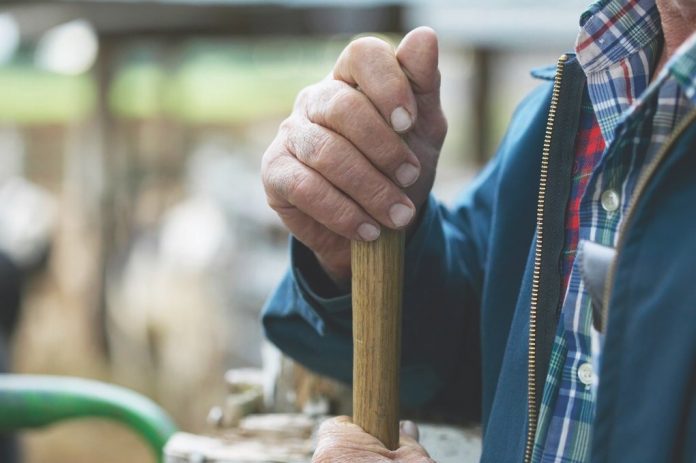Nathan Brown, of Nathan and Jennifer Brown Farms, in Hillsboro, Ohio, knows that it is a stressful time not only for him, but for other farmers, right now.
For him, “depression has been something that has been hard to shake” over the last month.
Ohio State Extension educators say farmers in their areas are facing challenges with markets, stress over being essential workers amid the global COVID-19 pandemic and concerns about the weather following a disastrous 2019 planting season.
All that worry — not only about individual farms, but about the country as a whole — adds up.
“It’s a stressful time for everybody right now,” Brown said. “We gotta realize that we’re all in this together and nobody is singled out.”
Crisis concern hotline: Call 1-800-447-1985.
Crisis Text Line: Text “4hope” to 741 741 to be connected to a trained crisis counselor.
National Suicide Prevention Hotline: Call 800-273-8255 for support for yourself or for loved ones.
Ohio State resources: u.osu.edu/2019farmassistance.
#gotyourback campaign: gotyourbackohio.org.
Markets
According to Purdue University’s agricultural economy barometer results from March, farmer sentiment on current and future conditions saw the largest one-month drop since Purdue started collecting this data in 2015. The COVID-19 pandemic played a part, with 74% of farmers saying they were concerned about how the virus would affect their farm.
“We’ve been in a steady decline in prices since 2012 … that part, I think guys were adjusting to, but now you throw in this virus that nobody knows what the outcome of the thing is going to be,” said Brown, who grows corn, soybeans and wheat, and has a cow-and-calf operation. “The coronavirus has really upset the cart.”
Chris Zoller, an extension educator in Tuscarawas County, said beef and dairy farmers are struggling with markets in his area. Sam Custer, of Darke County extension, said some dairy farmers are still unsure if or how they will be paid for the milk they had to dump recently.
Custer noted that while federal legislation has been enacted to support farmers, there are still many unknowns about how the aid will work.
Weather
The weather is another unknown. Brown said while farmers are hoping not to face the same challenges that plagued 2019, they are already seeing a similar weather pattern to what they saw in spring 2019.
“It’s definitely a worry in the back of everyone’s mind,” he said.
Risk
While some people are now working from home or off work due to the pandemic, farmers have the opposite issue. They still have crops to get in the ground, equipment to prepare, livestock to feed and care for, as essential workers.
Brown said this could put farmers at risk for the virus. He encouraged fellow farmers to create a plan for their spring crop planting.
“That way, if the community gets together to get crops planted if someone gets sick, we have access and know what to do,” he said.
Social
Economics and weather aren’t the only things weighing on some farmers’ minds.
“I think there is some anxiousness about being asked to stay at home,” Custer said. “That’s not the normal operating procedure.”
Many farmers spend long hours working alone, and enjoy going into town to talk to retailers or get coffee.
“Socially, it is an issue,” Custer said. “For some, especially those that are a little more extroverted, I think this is a very difficult time.”
Outreach
Extension offices are closed physically, so extension educators have had to adjust their outreach. Custer has been holding virtual coffee hours for farmers in his county on Tuesdays and Thursdays. He has had as many as 20 people join the virtual coffee hours, and has had farmers request to keep doing them.
Zoller has been holding virtual office hours, where farmers can call him or contact him over Zoom if they have questions or something that they want to talk about. He said some extension educators are also calling farmers that they work with and know well to check in on them.
“We’re trying to keep that going as best as we can,” he said.
Got your back
The Ohio Department of Agriculture, with Ohio State Extension and other agricultural and mental health groups, launched the #gotyourback campaign in 2019, in response to the challenges that farmers were facing.
“There’s a big stigma around mental health,” Brown said. “We don’t want to admit that we are struggling, but right now, we’re all struggling.”
The website launched with the campaign, www.gotyourbackohio.org, is still live and includes resources for farmers and families that are struggling.
OSU Extension also has resources for facing agricultural challenges, including mental health challenges, at www.u.osu.edu/2019farmassistance. The group has added a page to the website with COVID-19-related resources.
Support
Brown said that sometimes, stepping back from work, even during the planting season, can help with stress.
“It’s okay to take a few hours to get yourself back right again,” he said. “The work will still be there.”
He said considering positive things has been helpful for him. His children are out of school right now, and while their education is important, they are enjoying the spring calving season.
“My oldest boy got to help me tag a calf the other day,” Brown said. “He was so excited about it. We gotta sit back and realize all the blessings that we have.”
Brown also encouraged farmers to check on their neighbors.
“It’s okay to ask people if they’re okay,” he said. “And I want guys to know that if it’s more than what you can handle right now, it’s okay to reach out for professional help.”
Some mental health professionals are continuing to see patients through telehealth appointments. The Ohio Department of Mental Health and Addiction Services has a list of mental health providers on its website, www.mha.ohio.gov.











